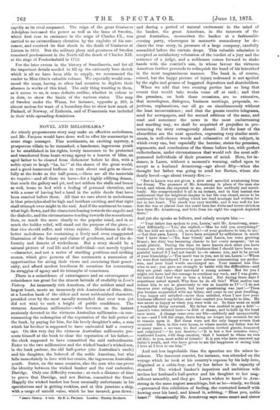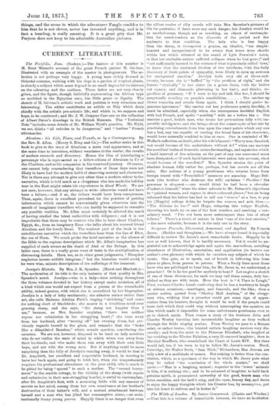NOVEL AND MELODRAMA.*
Ax utterly preposterous story may make an effective melodrama, and Mr. Farjeon would have done well to offer his manuscript to some stage manager. Fine sentiments, an exciting mystery, a prosperous villain to.be unmasked, a handsome, ingenuous youth to be established in his rights, lovely innocence to be protected and transferred from heart-wrung agony to a heaven of bliss, an aged father to be cleared from dishonour before he dies, with a noble cynic to laugh "ha, ha!" at the shams of the great world, and a good-humoured buffoon to rush about and grin as cheer- fully at the kicks as the half-pence,—these are all the materials we require—and all these we have—for a highly edifying drama, that sends the gallery and pit, and not seldom the stalls and boxes as well, home to bed with a feeling of personal elevation, and with a sense of having had a hand in the noble deeds that have been enacted before them. All that we care about in melodrama is that principles shall be high and incident exciting, and that right shall triumph over might in the end. And if the sentiment be some- what high-flown, and the characters leaning towards the angelic and the diabolic, and the circumstances tending towards the sensational, then, so much the more clearly to the popular mind, and in so much the bolder relief, will stand out the purpose of the piece,— that vice should suffer, and virtue rejoice. Melodrama is all the better melodrama for containing a lively and even exaggerated illustration of the beauty and claims of goodness, and of the de- formity and deserts of wickedness. But a story should be a natural picture of real life and of individual—not merely typical —character, and not a series of startling positions and striking scenes, which give persons of fine sentiments a succession of opportunities for airing their views and exercising their gener- osity, and afford modest loveliness fit occasions for recounting its struggles of agony and its triumphs of conscience.
There is a coincidence of extravagance and an extravagance of coincidence too great for the utmost latitude of credulity in Love's Victory. An immensely rich American, of the noblest mind and largest heart, meets an immensely rich Australian of ditto, ditto, at a London bank of the oldest and most unblemished character, presided over by the most rascally scoundrel that ever won (or did not win) to such a height of public confidence. The virtuous American millionaire—who becomes on the instant anxiously devoted to the virtuous Australian millionaire—is con- summating the redemption of the reputation of the hall-porter of the bank, by paying for him, for his lovely daughter's sake, a sum which his brother is supposed to have embezzled half a century ago. On this very day the virtuous Australian millionaire .pre- sents himself at the bank to clear the reputation of his father,— the clerk supposed to have committed the said embezzlement. Enter to the two millionaires and the wicked banker's wicked son, in the bank parlour, the old hall-porter (the Australian's uncle) and his daughter, the beloved of the noble American, but who falls immediately in love with her cousin, the ingenuous Australian youth. Enter, on the same occasion, also the man who can prove the identity between the wicked banker and the real embezzler, Davidge. Only one difficulty remains ; at such a distance of time to prove that Davidge, and not Barton, committed the fraud. Happily the wicked banker has been unusually unfortunate in his speculations and is getting reckless, and at this juncture a ship, with a cargo of untold value, which he has insured, goes down ; • Low's Victory. I vols. By B. L. Farieon. London: Thadoy Brothers. and during a period of natural excitement in the mind of the banker, the great American, in the interests of the great Australian, mesmerises the banker at a fashionable evening party, whereupon in mesmeric somnolency he de- clares the true story, in presence of a large company, carefully assembled before the curtain drops. This valuable admission in accepted as satisfactory refutation of the verdict of a jury and the sentence of a judge, and a nobleman comes forward to shake hands with the convict's son, in whose favour the virtuous American further proceeds to relinquish the hand of his betrothed in the most magnanimous manner. The bank is, of course, ruined, but the happy picture of injury redressed is not spoiled by the sighs and groans of beggared depositors and shareholders.
When we add that two evening parties last so long that events that would take weeks come off at each ; and that the premises, on both these occasions, are so extensive, that monologues, dialogues, business meetings, proposals, re- jections, explanations, can all go on simultaneously without the least inconvenience ; and that the guests receive telegrams, send for newspapers, and for second editions of the same, and read and announce the news in the most embarrassing and startling way, we shall be acquitted of prejudice in pro- nouncing the story outrageously absurd. Not the least of the absurdities are the neat speeches, expressing very similar senti- ments, in well-chosen words and exhaustive of the subject, in which every one, but especially the heroine, states the premises, arguments, and conclusions of the theme before her, with perfect collectedness, under circumstances that would rob the most self- possessed individuals of their presence of mind. Here, for in- stance, is Laura, without a moment's warning, called upon to accept as a husband Armstrong—age about fifty—when she thought her father was going to send her Barton, whom she dearly loved—age about twenty-five :—
" But to Laura was not given a slow and merciful awakening from her dream. The presence of Mr. Armstrong in place of the man she loved, and whom she expected to see, awoke her suddenly and merci- lessly. She comprehended it all in an instant, and in that instant she. understood that the brightest chapter in her life was closed, never to be continued to the happy ending which her fond musings had written for her in her heart. The shock was very terrible, and it was well for her- that she was so placed that she could turn her white and terror-stricken face from Mr. Armstrong, and hide from his sight the anguish depicted there."
And yet she speaks as follows, and calmly accepts him
Your father has spoken to you, Laura,' said Mr. Armstrong, some- what diffidently.—' Yes,' she replied.—'Has he told you everything?' 'He has told me much—oh, so much!—of your goodness to him, to me.' --L•Let that pass, Laura. I have been actuated by selfishness in much that I have done.'—'No, dear friend,' said Laura, her voice growing firmer; her duty was becoming clearer to her every moment ; 'let us speak plainly. During the time we have known each other you have treated me with such unwavering kindness that I should have been un- grateful indeed if I had not learnt to—to esteem you, and to be proud of your friendship.'—' The merit was in you, not in me, Laura.'—'When we were first introduced I was a poor actress commencing my profes- sion, and your kind words encouraged me. Your counsel was like wine to me ; you gave me strength to battle with the difficulties—and they are great ones—that surround a young actress. But for you I might not have had the courage to continue my work, and I was grate- ful indeed that I had won so true a friend. But during those days I sometimes asked myself, Why does he do all this? What motive can induce him to act so generously to one so humble as I? '= I do not deserve your eulogy, Laura, but your questioning was just.'—'Then you became acquainted with my father, and came to our poor dwelling.. I was happy and satisfied—more than satisfied, when I saw how your kindness affected my father, and what comfort you brought to him. He was never so happy as when you were with us. So time went on until a wonderful thing occurred. My father was enabled to pay a debt'— Laura's voice faltered here—'a debt of shame, and to hold up his head once more. A change came over our life—suddenly and unexpectedly to me—and I left the stage, there being no longer any occasion for me to remain upon it. But these were not the only happy events that occurred. Here, in this very house, to whose master my father was for so many years a servant, we find ourselves invited guests, honoured and respected.'—' As you deserve.'—' It is but a few minutes since,' continued Laura, with deep emotion' 'that I learned to whom we owe all this; to you, most noble of friends! It is you who have renewed my father's youth, and who have given to me the happiness of seeing him I love as I love to see him.'"
And not less improbable than the speeches are the minor in- cidents. The innocent convict, for instance, was attended on the voyage which he took at his country's expense by his lady-love, disguised as a cabin-boy, and by her father in the capacity of steward. The wicked banker's imperious and ambitious wife invites her husband's hall-porter and his daughter to her mag- nificent assembly, and they go. Laura wishes to kneel to Arm- strong in the same august assemblage, but as he—wisely, we think —prevented this exhibition of feeling, she contented herself with bowing over his hand, and kissed it, sobbing, "Bless you, noble heart!" Occasionally Mr. Armstrong says some smart and clever
things, and the scene in which the adventurer Fan& confides to him that he is not clever, never has invented anything, and is in fact a humbug, is really amusing. It is a great pity that Mr. Farjeon does not keep to his admirable Australian pictures.



































 Previous page
Previous page